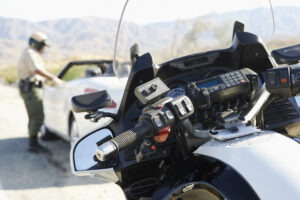Virginia, like many states with aging infrastructure, is facing a dangerous combination. There are more drivers on the roads each year. More of those drivers are distracted by the use of cellphones to talk, text, or email. And, more of the roads on which those distracted drivers are driving are under repair.
A survey of 409 police officers who patrol Northern Virginia’s roadways found that cellphone use was to blame in one in three work-zone accidents. They said sending or reading text messages was twice as likely to cause car accidents than any other driver error. The region's police officers also say that the number of work-zone accidents is way up due to drivers use of mobile phones to talk or text.
This week, AAA and a company hired to build high-occupancy toll lanes in Virginia presented results of a survey they conducted of Northern Virginia police officers. Nearly 80 percent of the police officers said that banning cellphone use while driving would dramatically reduce road accidents.
In an earlier report, AAA said that more than half of the 210,000 drivers who use the Capital Beltway each day are distracted by cellphones.
“Navigating the extensive work zones in Northern Virginia requires drivers’ full attention,” Virginia Secretary of Transportation Sean Connaughton said. “It is important for drivers to realize that distracted driving in a construction work zone poses an enormous threat to the safety of our workers and their fellow travelers.”
The National Highway Traffic Safety Administration reported that 5,474 people died and 448,000 were injured in 2009 in crashes in which distracted driving was involved.
Distracted driving becomes significantly more dangerous in work zones, where lane changes, lane closures, uneven pavement and narrow lanes require even greater driver concentration. This is not rocket science. We all know this to be true. The problem is that many of us believe that it is dagnerous for the other guy to drive distracted. We falsely believe that we can handle it. Well, none of us can operate a vehicle at highway speed while our eyes are not on the road. At 60 mph, the vehicle is traveling approximately 30 yards per second. If a driver takes six seconds to send or read a text at 60 mph, he or she has just traveled the length of two football fields without looking at the road.
Here are some startling facts and findings:
The National Safety Council reported that drivers using cellphones look but fail to see up to 50 percent of the information in their driving environment. A Virginia Tech Transportation Institute study of truck drivers found that they were 163 times more likely to have an accident or near accident if a driver is texting, e-mailing or accessing the Internet.
The New England Journal of Medicine reported that a person using a cellphone when driving is four times more likely to have a crash that will result in going to the hospital.
Some of the worst distracted driving crashes have not been caused by passenger vehicle drivers. Investigations of high-profile accidents by the NTSB found that:
●In 2004, a bus driver who was distracted while on his hands-free cellphone struck the underside of an arched stone bridge on the George Washington Parkway in Alexandria, Virginia. Eleven of the high school students on board were injured.
●In 2008, 25 people died when two trains collided in California. The commuter train engineer, who had a history of using his cellphone while on duty, ran a red signal while texting.
●In 2010, two people died when a tugboat towing a barge ran over an amphibious boat in the Delaware River. The tugboat mate was distracted by repeated use of a cellphone and laptop computer.
●In 2010, 11 people died in Kentucky when a tractor-trailer crossed the median and collided with a 15-passenger van. The truck driver lost control because he was distracted by his cellphone.













Comments for this article are closed.